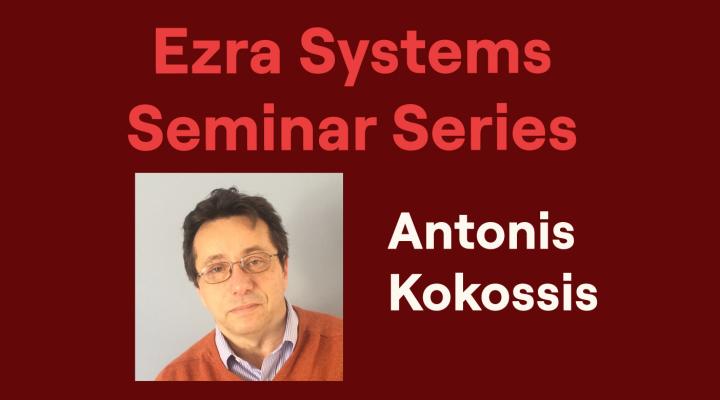
Prof Kokosis visiting Cornell University on Friday November 10th to participate at Ezra Systems Seminar Series with a Lecture entitled:
Carbon-based renewable feedstocks: a holistic use in the context of circular economy
Carbon-based renewable feedstocks constitute the most abundant resources of renewable supplies and the ones largely underused and neglected. The design of biobased pilots and installed facilities bears tremendous social and economic benefits. By 2020, Bloomberg predicts that, only in Europe, there would be around 1,000 of such new units bringing €32.3 trillion revenues and 1 million new jobs. A systems approach has a pivotal and critical role in the development of such facilities. The general view is increasingly supported by results and analysis that prove the significance of systems engineering in future developments. The design and synthesis of biobased processes constitutes a complex problem challenged to cope with the large and unknown product portfolios as they arise from different chemical itineraries and processing paths (value chain analysis) as well as process engineering options to select units and integrate them into a plant (process synthesis, process integration). In all cases, the designs are required to match maximum efficiencies in the use of materials/energy and to assess uncertainties in processing and economic parameters that may affect the selected designs and the level of integration.
Rather than with a focus on individual technologies, the presentation aims at systems analysis and the integration with social networks. Research work is explained on tested, real-life applications. The work combines methods in process synthesis and integration, optimization and process modelling. The coordinated use of systems methods constitutes a significant advancement in the state of practice, currently relying on business models of the past, or case-by-case analysis. The methodology is applied to several real-life biobased facilities that include lignocellulosic and oleochemical biorefineries, halophytic algal biorefineries and, more recently, waste biorefineries. The lignocellulosic applications involve chemistry paths with 70-odd chemicals that include basic intermediates (sugars, lignin, ethylene, oils), bulk chemicals (ethanol, butanol, propanol, isopropanol), bio-based polymers (PVC, resins, polyamides, PEIF, polyacrylates, PUs), and a wide range of chemicals (xylitol, xylonic acid, itaconic acid, sorbitol, isosorbide, hydrogel etc.). Preliminary results report impressive savings. Besides the systematic framework for screening and analysis, results managed 70% energy savings and 50-60% water savings. Research is strongly coordinated with LCA. Results demonstrate that, unless fully integrated, processes of carbon-based renewables are difficult to remain sustainable. Instead, as fully processes, they stand as attractive and adaptable options with a strong promise in developing into sustainable industries.
The analysis explores a new generation of methods that combine systems engineering, emerging dataspaces, and promising digital services. The applications are rich in opportunities both to model nonconventional complex processes as well as to visualize, monitor, even define terms of sustainability. The work holds promises to engage social communities and promote circular economy paradigms by means of novel business models. Semantics and ontology engineering prove important to integrate knowledge domains with very different context. Data engineering are demonstrated with the development of ex-ante LCA methods. Circular economy paradigms are discussed as industrial symbiosis in textile industry, and, in the context of social networks, in bioenergy networks for urban and rural communities sharing results and applications from 3 different projects and four different EU ports.
More information can be found HERE.
